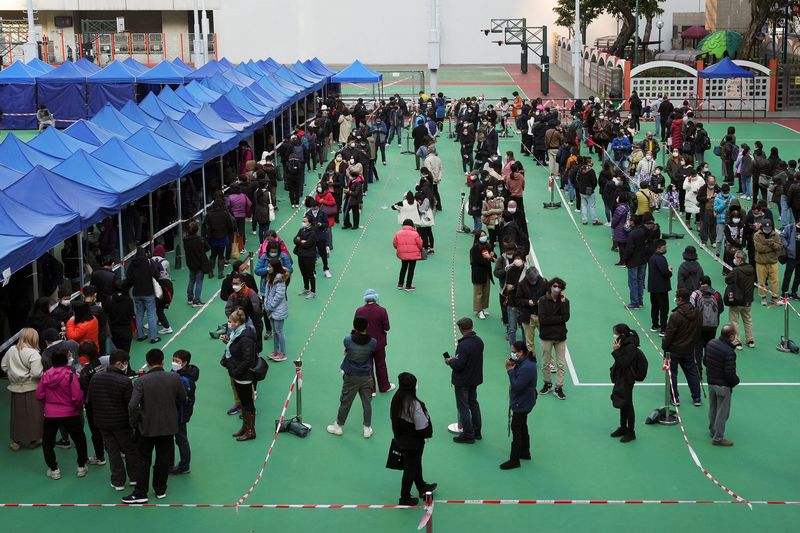By Nancy Lapid
(Reuters) - The following is a summary of some recent studies on COVID-19. They include research that warrants further study to corroborate the findings and that has yet to be certified by peer review.
Coronavirus infection raises risk of mental health issues
Psychological stress from the pandemic may be widespread, but those who have had COVID-19 are at much higher risk for new mental health problems than individuals who have managed to avoid the virus, according to a new study.
Researchers compared nearly 154,000 people who survived at least a month after a SARS-CoV-2 diagnosis to more than 5.6 million peers without prior COVID infections. Over the course of one year, infection survivors were at 35% higher risk of new anxiety disorders, 39% higher risk for new depressive disorders, 55% higher risk for new use of antidepressants, 34% higher risk for a new opioid use disorder, and 20% higher risk for a new non-opioid substance use disorder. They were also at 80% higher risk for newly detected neurocognitive decline and 41% higher risk for a new diagnosis of sleep disorders. The risks for these problems "were increased even among people who were not admitted to hospital" but were highest among those who had been hospitalized for COVID-19, the researchers reported in The BMJ.
"To all the people who are suffering from one or more of these conditions: you are not alone," said study leader Ziyad Al-Aly of Washington University in St. Louis. "Seek help. It is always better to get these things identified and treated early." The problem needs attention from policy makers and governments "before it balloons into a much larger crisis," he said.
Omicron subvariant not making people sicker in South Africa
The BA.2 version of the Omicron variant of the coronavirus, while potentially more transmissible than its BA.1 predecessor, has not led to more hospitalizations or more severe disease in South Africa, researchers have found.
Using national databases to track patients diagnosed with COVID-19 from Dec. 1 through Jan. 20, researchers reported on Saturday on medRxiv ahead of peer review that hospitalization rates were 3.4% for those infected with original Omicron and 3.6% for individuals with BA.2 infections. Among 3,058 patients who required hospitalization for COVID-19, severe disease was diagnosed in 33.5% of original-Omicron patients and 30.5% of BA.2 patients. "By the end of January 2022, most COVID-19 infections were due to BA.2," said Dr. Nicole Wolter of South Africa's National Institute for Communicable Diseases in Gauteng. "We found that individuals that were infected with BA.2 did not have a higher risk of being admitted to hospital," she said.
"While BA.2 may have a competitive advantage over BA.1 in some settings, the clinical profile of illness remains similar," the researchers concluded. However, they noted that because many people in South Africa had previously been infected with earlier variants, their findings may not be typical or translate easily to other countries.
Experimental lasers detect virus in saliva with PCR accuracy
An inexpensive, compact version of equipment that is usually bulky and costly can find the coronavirus in saliva with the accuracy of a PCR test and the speed of rapid antigen tests, according to Spanish researchers.
The experimental device employs flow cytometry, which uses lasers to count and sort cells and particles in liquid as it flows through a very small tube. The saliva is mixed with a solution containing fluorescent antibodies that attach themselves to any coronavirus particles. After about 20 minutes, the liquid gets passed through the tube, where lasers will detect any fluorescence and trigger a positive reading, the researchers explained on Tuesday in Biomedical Optics Express. When they tested saliva samples from 34 people with SARS-CoV-2 infections and 20 uninfected individuals, the device was 91.2% accurate at detecting the virus and 90% accurate at identifying uninfected individuals. It was also able to find the virus at much lower concentrations than can be detected with rapid antigen tests, according to the report. "Given the results, we believe that our (equipment) in conjunction with saliva samples has great potential for becoming a fast, portable, user-friendly point-of-care device, able to perform up to 2000 tests per day," the researchers concluded.

"By selecting proper antibodies, this technology could also be adapted for the detection of other viruses, such as ... influenza virus, or even microorganisms in water, such as Legionella and E-coli," coauthor Ewelina Wajs of The Institute of Photonic Sciences in Barcelona, said in a statement.
For a Reuters graphic on vaccines in development: https://graphics.reuters.com/HEALTH-CORONAVIRUS/VACCINE-TRACKER/xegpbqnlovq/